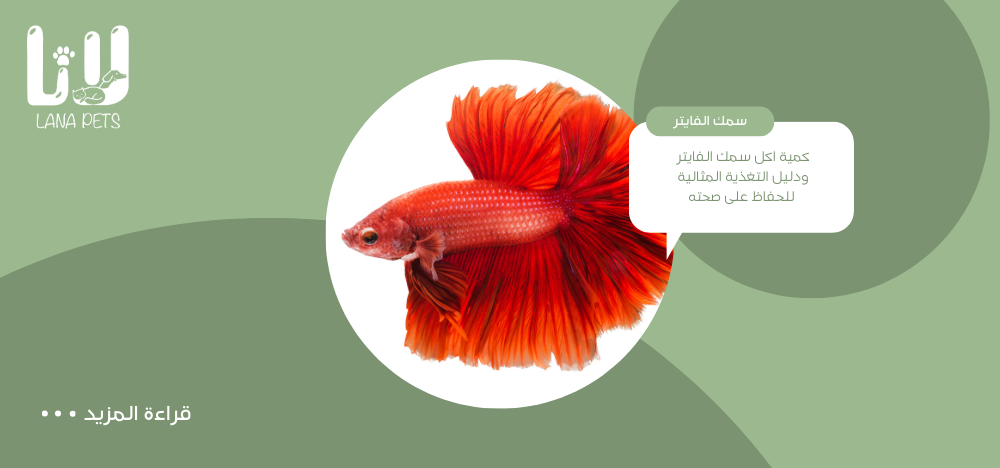
The importance of determining the amount of food for betta fish
Determining the right amount of food for your betta fish is essential for maintaining its health and well-being. Here's why it's important to accurately measure food intake:
- Achieving nutritional balance : The right amount of food helps provide all the nutrients your betta fish needs, including proteins, vitamins, and minerals, contributing to its healthy growth and overall health.
- Preventing Obesity : Overfeeding can lead to obesity, a common problem among betta fish that can lead to health issues such as poor mobility and bladder disease. Determining the right amount of food helps maintain a healthy weight.
- Improved Digestion : Providing the correct amount of food contributes to improving the digestion and metabolism of betta fish, reducing the risk of digestive problems such as constipation or rot.
- Reducing environmental pollution : Overfeeding can lead to excess waste in the water, increasing pollution and negatively impacting the quality of the aquarium's water. Regulating food intake helps maintain clean water and a healthy aquatic environment.
- Boosting Activity and Vitality : A balanced diet helps betta fish maintain their activity and vitality, contributing to their active behavior and attractive appearance.
- Avoiding health problems : The right amount of food protects betta fish from other health problems such as intestinal inflammation or a weak immune system, which may result from malnutrition or overfeeding.
- Improving the breeder's experience : By determining the appropriate amount of food, the breeder can easily monitor the fish's health and identify any health problems early, enhancing the overall breeding experience.
Paying attention to the appropriate amount of food for your betta fish is an essential part of comprehensive care that ensures the health of your fish and its aquatic environment.
Types of food suitable for betta fish
The types of food provided are a key factor in determining how much a betta fish should eat, as the right types of food can significantly enhance the health and growth of your betta fish. Here's a look at the types of food that are ideal for this species:
- Dry foods :
- Specialized pellets for betta fish : Lana Pets offers pellets specifically designed for the needs of betta fish, containing a balanced blend of proteins, vitamins, and minerals.
- Food flakes : These are also a suitable option, as they provide complete nutrition and can be helpful in supporting growth and overall health.
- Live foods :
- Bloodworms : A rich source of protein preferred by betta fish, they can help improve color and activity.
- Water fleas : They are also a good choice as a food source rich in proteins and vitamins.
- Frozen foods :
- Frozen white worms : Provide the same nutritional benefits as fresh, but are safer in terms of avoiding parasitic diseases.
- Frozen shrimp : They can be an excellent addition to a betta's diet and are a good source of protein.
- Fresh foods :
- Small fish : Such as small fresh fish, which can be a nutritious addition to a fish's diet, but you must ensure that they are served appropriately.
- Homemade foods :
- Fresh food mix : You can prepare a mix of fresh foods such as cooked fish and mashed vegetables, but you must ensure that all ingredients are suitable and appropriate for the betta fish.
- Foods rich in vitamins :
- Vitamin-enriched foods : Some foods are fortified with additional vitamins, which can help promote overall health and increase disease resistance.
- Food for colors :
- Color-enhancing foods : Some foods contain nutritional supplements that enhance the colors of betta fish, helping to highlight their beautiful natural colors.
It's important to diversify your betta fish's diet to ensure a balanced and complete diet. Make sure to feed in appropriate quantities and avoid overfeeding to ensure the fish's health and growth.
How to feed betta fish the specified amount of food
Providing your betta fish with the right amount of food is crucial to ensuring its optimal health and growth. Here are steps and methods for effectively providing the specified amount of food:
- Determine the daily amount :
- Determining the amount : The daily amount of food for betta fish is usually a small amount proportional to the size of the fish, often an amount equal to the size of the fish's head.
- Divide meals : Divide this amount into two to three meals per day instead of serving the entire amount at once.
- Check food volume :
- Dry Foods : Use a teaspoon or measuring cup to measure the exact amount of pellets or flakes. A small amount, such as a few pellets, may be sufficient at each feeding.
- Live or frozen foods : Use a small amount of live or frozen foods, such as a few white worms or small pieces of shrimp.
- Food presentation methods :
- Hand feeding : Use your fingers or a small spoon to place food into the bowl, making sure not to overfeed.
- Using a feeder : If you use an automatic feeder, make sure it is set to the appropriate amount and timed correctly to avoid overfeeding.
- Monitoring reactions :
- Monitor food intake : Monitor your betta's food intake. If it leaves a large amount of food behind, the amount being fed may be too large.
- Adjust the amount as needed : If you notice that food remains in the tank for long periods, reduce the amount provided to avoid environmental contamination.
- Cleaning the sink after eating :
- Remove excess : If there is uneaten food left in the tank, remove it to avoid water pollution and improve the quality of the aquatic environment.
- Monitor water quality : Keep the water clean and monitor for any changes in quality due to excess food.
- Diversify your diet :
- Switching Foods : Offer different types of food to ensure your fish receives a varied and balanced diet. Alternating between dry, live, and frozen foods can improve your fish's overall health.
- Avoid overeating and starvation :
- Do not overdo it : Serve the right amount and avoid overdoing it to avoid health problems.
- Avoid starvation : Avoid offering very small amounts on a continuous basis, as this may lead to malnutrition.
In conclusion, determining the amount of food your betta fish should be fed is key to maintaining its health and optimal growth. By providing the appropriate amount of food, you can ensure your fish receives the necessary nutrients without risking health problems such as obesity or digestive disorders. Understanding how to properly feed and monitoring your fish's response helps maintain a clean and healthy aquatic environment, enhancing your betta's well-being and ensuring a life full of activity and vitality. Careful attention to betta fish nutrition plays a vital role in achieving a proper nutritional balance, which contributes to enhancing their beautiful colors and active behavior.

